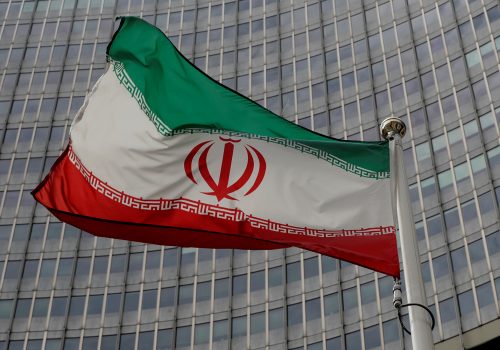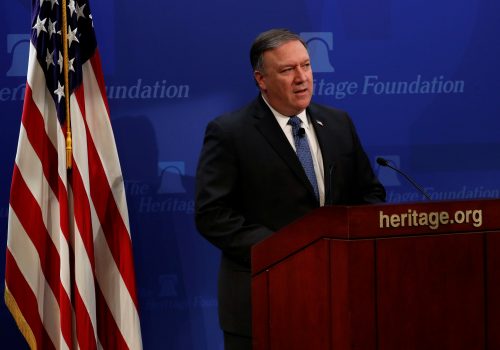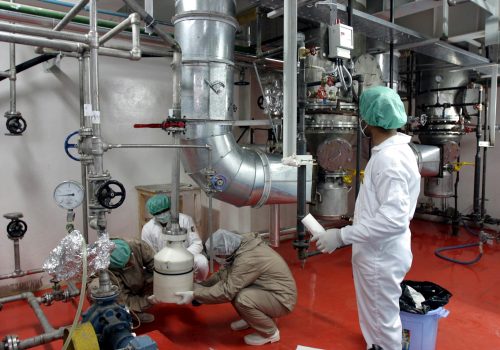IAEA mildly reprimands Iran over suspect nuclear sites
After more than a year of stonewalling about apparently undeclared nuclear material at a site in Iran—and months of refusing access to two other sites—the Islamic Republic of Iran could have been in for harsh condemnation when the International Atomic Energy Agency (IAEA) Board of Governors met on June 19.
Iran hawks in and outside the US government wanted a finding of non-compliance with Iran’s safeguards agreement with the IAEA and a report to the UN Security Council to buttress their campaign of “maximum pressure.”
That did not happen. Instead, the board on June 19 issued a mild rebuke, echoing IAEA Director General Rafael Grossi’s expression of “serious concern” that Iran has not provided access to two locations where unreported nuclear activity allegedly took place nearly two decades ago. He added that Iran has not clarified Agency questions related to possible undeclared nuclear material and nuclear-related activities. Repeating the director general’s words and calling on Iran to cooperate was the least the board could do in this situation if it was to uphold the Agency’s responsibilities. Bloomberg IAEA watcher Jonathan Tyrone called the result a “milquetoast resolution.”
Iranian officials, however, naturally took offense, vowing to take appropriate action in response. Hopefully, any reactions will not be counterproductive. If, for example, Iran were to reduce the cooperation it has been extending to the IAEA in recent years, that would only give hawks more ammunition and could further undercut the 2015 nuclear deal, known as the Joint Comprehensive Plan of Action (JCPOA). It should be noted that Iran has otherwise been cooperative with the IAEA.
Iran has found international sympathy since US President Donald Trump’s unilateral withdrawal from the JCPOA two years ago and re-imposition of draconian sanctions. It must not be easy for Iranian citizens to distinguish between the illegitimate pressure waged by Washington and the IAEA’s entirely legitimate insistence on knowing what happened with unreported nuclear material—reportedly traces of natural (not enriched) uranium. But being bullied by Trump does not obviate Iran’s obligations under its safeguards agreement, predating the JCPOA, to answer IAEA questions.
France, Germany, and the United Kingdom (the E3), who took the lead in pushing the board’s June 19 resolution, were not acting at the United States’ behest. Neither were they acting as part of some broader negotiation with Washington to avert US threats to “snap back” UN sanctions if an embargo on conventional arms transfers to Iran expires, as required by the JCPOA, in October. The Europeans have been consistent in both opposing Trump’s efforts to scuttle the JCPOA and in supporting IAEA verification work. Calling out Iran was necessary to maintain the integrity of the safeguards system.
While Iranian officials are loath to admit it and few of them even knew about the activity, their country did engage extensively in nuclear weapons development work at least until 2003, as assessed by the IAEA in 2015. Foreign Minister Mohammad Javad Zarif’s claim that Iran has nothing to hide is clearly untrue. Most of the past weapons work remains unexplained and more of it has come to light as a result of an Israeli raid in 2018 of a warehouse in the outskirts of Tehran that housed curated documents about the program.
To smooth the way for implementation of the JCPOA—under which Iran was required to forfeit most of its stockpile of low-enriched uranium and accept other limitations on its program that would make it difficult to quickly develop weapons—the IAEA decided to largely close the file on these questions about nuclear activity of a possible military dimension (PMD) in late 2015. However, they decided not to turn a blind eye to any new evidence that might emerge. As former IAEA legal official Laura Rockwood explained in a June 19 media/press call organized by the European Leadership Network, the agency’s requests over the past year for answers and access do not derive from the PMD file, but from the Agency’s obligation to verify the correctness and completeness of Iran’s declarations about its nuclear materials under its safeguards agreement.
The fact that the new evidence came at the hands of arch-enemy Israel, which itself has a nuclear weapons arsenal that it does not publicly acknowledge, is understandably galling to Iran, not to mention embarrassing to have the Mossad steal the “atomic archive” from under one’s nose. The way the documents were acquired does not diminish their significance, however.
The IAEA did not take the documents at face value nor rush to judgment. After careful vetting, including confirming the accuracy of the translations, the IAEA assessed that the information was broadly credible. Before drawing any conclusions, the agency now seeks Iran’s cooperation to explain what happened. The Secretariat’s handling of the matter has been prudent, measured, and technically sound. Iran’s claim of “fabricated information” is baseless.
Nor is the IAEA’s request an infringement on sovereignty, as claimed by Iran’s ambassador in Vienna, Kazem Gharibabadi. In joining the Nuclear Non-Proliferation Treaty under the pre-1979 shah’s regime, Iran, like other countries, accepted an obligation to allow inspection of nuclear sites for legitimate reasons.
Absent Iranian cooperation with the agency, the issue will not go away regardless of who wins the US presidential election in November. On the other hand, if the US rejoins the JCPOA as Democratic presumptive nominee Joe Biden has suggested he might, it would give the Iranian government political cover to abide by the IAEA requests.
The current US administration is hypocritical in condemning Iran for not accepting complementary access requests, as required by the Additional Protocol. Not to excuse Iran’s intransigence, but its obligation to abide by the Additional Protocol is derived from the JCPOA, from which the US has reneged on its obligations for sanctions relief. Thus, the E3 was right to express concern about actions by both Washington and Tehran.
Mark Fitzpatrick is an associate fellow at the International Institute for Strategic Studies. Before IISS, he had a 26-year career in the US Department of State, including as Deputy Assistant Secretary for Non-Proliferation (acting). Follow him on Twitter: @MarkTFitz.
Image: International Atomic Energy Agency (IAEA) Director General Rafael Grossi addresses the media after a board of governors meeting at the IAEA headquarters in Vienna, Austria June 15, 2020. Picture taken June 15, 2020. REUTERS/Leonhard Foeger


